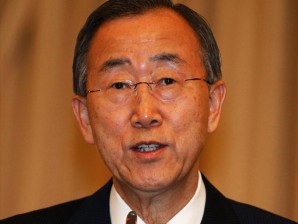Outrage as media death toll mounts on world press day
UNITED NATIONS—UN leader Ban Ki-moon on Thursday led international outrage at the growing number of journalist killings, as the bodies of two dead photographers were found in Mexico on World Press Freedom Day.
Ban told a press freedom at the UN headquarters that journalists now face “dire threats” and highlighted that more than 60 were killed in 2011.
Amid international tributes to journalists such as Marie Colvin of the United States and Remi Ochlik of France who were killed in the Syrian protest city of Homs in March, some press freedom groups say this year could see an even worse media death toll.
Mexican security forces on Thursday found the dismembered bodies of two missing photographers — Guillermo Luna Varela and Gabriel Huge — in a canal in the eastern state of Veracruz, authorities said.
In Somalia, radio reporter Farhan Jeemis Abdulle was shot dead by gunmen on the eve of World Press Freedom Day, police said. Abdulle was the fifth Somali journalist gunned down this year.
Article continues after this advertisementThe UN secretary general said “countless” reporters “face intimidation, harassment and censorship at the hands of governments, corporations and powerful individuals seeking to preserve their power or hide wrongdoings and misdeeds.”
Article continues after this advertisement“Impunity for those who attack or threaten journalists remains disturbingly prevalent,” he added, calling attacks on journalists “outrageous”.
Reporters Without Borders said even before the bodies of the Mexican photographers were found, 22 reporters and six bloggers and “citizen journalists” have already been killed since the start of the year.
According to Reporters Without Borders, five journalists have been killed in Somalia this year, four in Syria — including Colvin and Ochlik — two each in Bangladesh, Brazil and India, and one in Indonesia, Iraq, Lebanon, Nigeria, Pakistan, the Philippines, Thailand.
Andrei Netto, a correspondent for Brazilian daily O Estado de Sao Paulo who was abducted in Libya last year, said it was important to cover high-profile conflict such as the Arab uprisings, but more focus should be given to helping journalists in countries which call themselves democratic.
“We have to protect journalists in democratic countries first of all. There are tens of countries which are democratic and do not respect the law as they should do,” he said at a UN event on press freedom organized by France and Greece.
Reporters Without Borders said that more than 280 journalists and bloggers have been imprisoned this year, including 32 in Eritrea, 30 in China and 27 in Iran and 14 in Syria. But five have been detained in Azerbaijan, which is the UN Security Council president for May.
Ban and press freedom groups have sought to stress the role of the media, and particularly the new social media, in covering the uprisings in Libya, Egypt and Syria over the past 18 months.
“Those new voices and new modes of communication have helped millions of people gain, for the first time, the chance at democracy and opportunities that had been denied to them for so long,” Ban said.
The Freedom House rights group said the Middle East and North Africa experienced “dramatic if precarious gains” in press freedom last year after the uprisings. But it added that Bahrain and Syria launched “harsh media crackdowns” as part of government crackdowns on uprisings.
The group said that China, Russia and Iran have kept a tight grip on the media by detaining critics and shutting down media outlets.
